What are the Rules for Global Giveaways in 2024?
Giveaways are among the best ways to promote your brand or business wherever you live, but are they legal?
Most countries have similar regulations regarding the measures that must be taken to keep your giveaway within the law. However, each country has varying requirements.
Una cosa es elegir la promoción adecuada para su empresa y otra asegurarse de que no infringe la ley al llevarla a cabo. Por este motivo, organizar tu primer sorteo puede resultar desalentador, ¡así que consulta nuestra guía de sorteos!
This guide will help you understand your home country’s rules so you can run your giveaway above board. First, look at a Giveaway Terms And Conditions Template we have prepared for you. You can use this as a reference and replace the variables (mentioned within the “[” and “]” with your relevant data.

Giveaway Terms and Conditions Template
Terms and Conditions for [Organiser Name]’s [Social Media Platform] Giveaway Contest as of [Date]
- Elegibilidad: The giveaway contest is open to participants who meet the following criteria:
- Reside en [País/Región]
- Tiene [Edad] años o más
- No son empleados de [Nombre del organizador] o sus filiales, ni miembros de sus familias inmediatas u hogares.
- Entrada: To enter, participants must follow the instructions outlined in the contest post on [Social Media Platform]. Entry requirements may include liking, sharing, following, or tagging friends. Entries complete, accurate, or submitted after the deadline will be disqualified.
- Duración: The giveaway contest starts on [Start Date] and ends on [End Date] at [Time] [Time Zone]. Only entries submitted before the deadline will be considered.
- Premio: The winner will receive [Prize Description]. As defined in the terms, the prize is non-transferable, and there will be no cash alternatives to it. [Organiser Name] reserves the right to substitute the prize with a product or service of equal value.
- Selección de ganadores: The winner will be selected randomly from all eligible entries by the deadline. The winner will be notified by [Social Media Platform] direct message within [Number of Days] days after the deadline. If the winner does not respond within [Number of Days], another winner will be selected.
- Publicity: By participating in the giveaway contest, the winner agrees to allow [Organiser Name] to use their name, photograph, and likeness for promotional and advertising purposes without compensation.
- Liability: [Organiser Name] is not responsible for any injury, loss, or damage to participants or their property related to their participation in the giveaway contest. Participants agree to release and hold harmless [Organiser Name] and their affiliates from any liability, injury, loss, or damage resulting from participation in the giveaway contest or acceptance, use, or misuse of the prize.
- Governing Law: The giveaway contest and these terms and conditions are governed by and construed per the laws of [Country/Region].
- Resolución de litigios: Any dispute arising from or related to the giveaway contest or these terms and conditions will be resolved through binding arbitration per the rules of [Arbitration Service]. The arbitration will occur in [City], [Country/Region], and the arbitrator’s decision will be final and binding.
- Modification: [Organiser Name] reserves the right to modify, suspend, or terminate the giveaway contest without notice. [Organiser Name] also reserves the right to modify these terms and conditions without notice.
Este modelo de condiciones del sorteo ha sido facilitado gratuitamente por GiveawayListing.com como punto de referencia, pero no constituye una reclamación legal por parte de nadie más allá de [Nombre del organizador].
Al participar en el concurso de regalos, los participantes aceptan regirse por las presentes condiciones, tal y como las define [Nombre del organizador].
Last update: 08-09-2024

Regalos en todo el mundo
All worldwide giveaways are divided into four categories: sweepstakes, Raffles, Rewards, and Contests. We will explain each type in detail later.
Sweepstakes or giveaways’ main features:
- Basado en la suerte
- Promoción gratuita
- Ganador elegido al azar
- A veces se ofrecen entradas adicionales (gratuitas)
Raffle or lottery main features:
- Basado en la suerte
- Promoción de pago (con algún tipo de entrada)
- Ganador elegido al azar
- En ocasiones, se ofrecen entradas múltiples (de pago)
Recompensa los rasgos principales:
- En función de los méritos
- Promoción gratuita o de pago
- Los participantes deben cumplir los requisitos para ganar
- Normalmente, más de un ganador
Características principales de los concursos:
- En función de los méritos
- Promoción gratuita
- Los ganadores se seleccionan en función de su destreza
- Concurso/basado en el talento (suele haber un ganador)
Nota: Las promociones gratuitas son las más fáciles de gestionar. Existen restricciones legales para las promociones de pago, como sorteos o loterías, ya que se consideran juegos de azar.
Consejo: Normalmente se necesita una licencia para realizar un sorteo de pago. Sin embargo, algunas lagunas legales garantizan que esto no se aplique en tu caso.
You can also choose to run a free giveaway. Free giveaways work just as well as paid ones (or possibly even better) for your business.

9 Ways to Run a Legal Contest in 2024
Wherever you may be, here are 9 ways to run a viral contest utilizing universal giveaway terms and conditions.
1. Be Transparent
Generally, you need to be transparent as a giveaway organizer. If anyone requests the giveaway details or the list of winners from your giveaway, you need to have them on hand.
Algunos países exigen que se envíe la lista de ganadores a las autoridades locales, por lo que es necesario conocer la legislación local (más información más adelante).
In addition, you are not allowed to ask participants to visit a third-party site as an entry requirement for the giveaway. If you ask participants to visit third-party sites, you may have to prove your reason, which could get you in trouble.
2. Check Local Laws
You should check local laws and guidelines for where you are holding giveaways. Also, ensure you know if other countries can enter your giveaways before offering prizes to entrants in that country!
Por ejemplo, algunos estados de EE.UU. prohíben los requisitos de compra (como las cuotas de inscripción) cuando los ganadores se eligen por mérito o habilidad.
3. Detail Official Rules
You must disclose all information about your contest in the official rules wherever you are. You should include how the winner/s will be selected, how many winners will be, and so on. Make sure you detail anything specific to your giveaway rules.
This step is essential to prove your contest is trustworthy and legal. If anyone requests your giveaway information, you must have it readily available. You don’t have to write essays either — one sentence per rule is sufficient.
4. Be Prize-Specific
You should also be specific about your prize. Include a photo of the prize, write details about it (color, size, where it’s from, etc.), and how the winner will receive it.
The more information you can give about your prize, the better. You want your giveaway participants to look forward to winning the prize, but more importantly, this step proves that you are running a trustworthy contest.
Eche un vistazo al siguiente ejemplo. El post del sorteo incluye detalles sobre los premios que se ofrecen junto a una imagen llamativa.

5. Specify a Deadline
Outline the duration of your giveaway from beginning to end. The promotion duration is an essential component of your contest terms and conditions.
Este paso garantiza que los participantes no se sientan innecesariamente decepcionados si el sorteo finaliza antes de tiempo o no empieza a la hora prevista.
You also need to know when the contest ends so you know when to stop allowing entries. This portion of your giveaway rules ensures you hold a contest within most law guidelines.
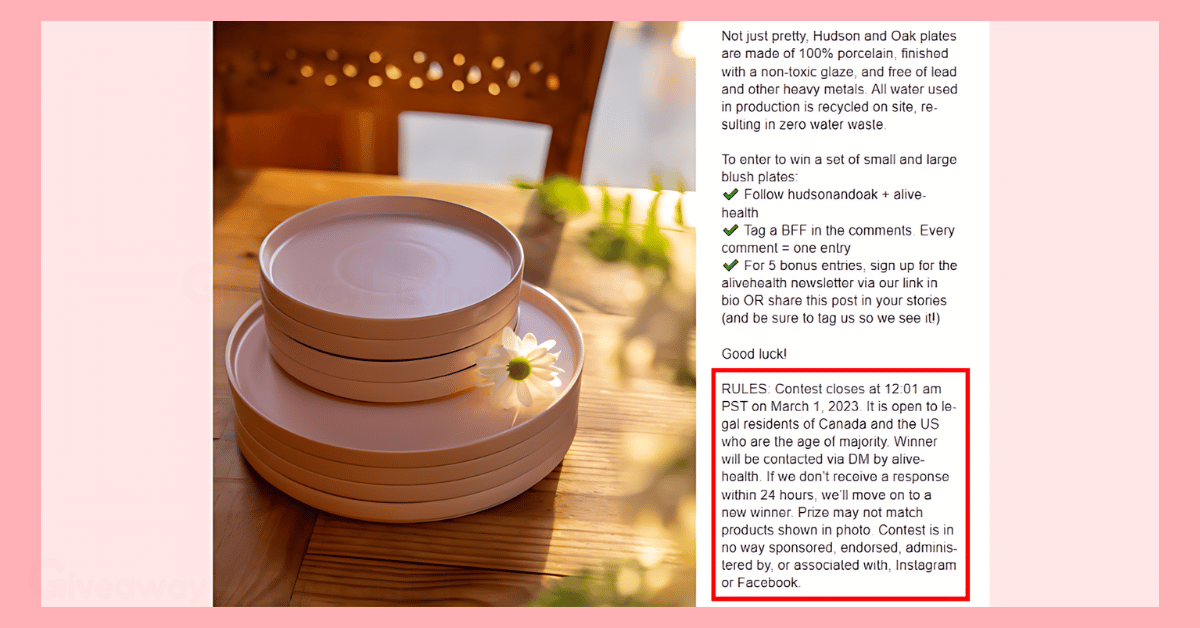
6. Make it Free
Este componente de un concurso es bastante universal. Dondequiera que se celebre el sorteo, suele ser contrario a la legislación local monetizarlo a menos que se disponga de una licencia (con algunas excepciones).
En todo el mundo, nunca debe obligar a nadie a comprar una participación para su sorteo. Hacer que su sorteo sea completamente gratuito es especialmente necesario si selecciona a los ganadores al azar, ya que esto se considera una lotería y se necesita un permiso para organizar loterías.
7. Keep Data Secure
This rule applies to everyone. Regardless of where you are in the world, you agree to keep your participant’s personal information secure.
Si organizas un sorteo en las redes sociales, debes confiar en que la plataforma de las redes sociales mantiene a salvo la información de los participantes.
Still, you must inform your participants that their data is safe with you. Ensure you read the guidelines for social media platforms you use for a giveaway, and use our tips in this guide.
8. Specify Eligibility Requirements
Debes indicar claramente quién está excluido de participar en tu sorteo debido a restricciones de edad, país o cualquier otra norma que establezcas.
Identifique las restricciones de participación y no incluya a determinados grupos de personas en las normas y directrices oficiales si no pueden participar en el sorteo.
It’s common to restrict entries to people under 18 and certain regions with strict giveaway laws, such as Northern Ireland.
9. Prepare Winner Announcement Rules
Ensure you decide how your winner will be established and announced in your giveaway terms and conditions! For example, you might need to select your winner randomly or use a computer program (such as a third-party app).
Si organizas un concurso como una competición, debes informar a los participantes de cómo juzgarás sus propuestas.
All of these general giveaway rules will ensure you run a practical giveaway. With any luck, you will run a viral contest in no time.
Bonus tip: Check out the Lista de regalos for more helpful tips to support the success of your contests! We have also included more helpful guides we’ll love throughout this one.
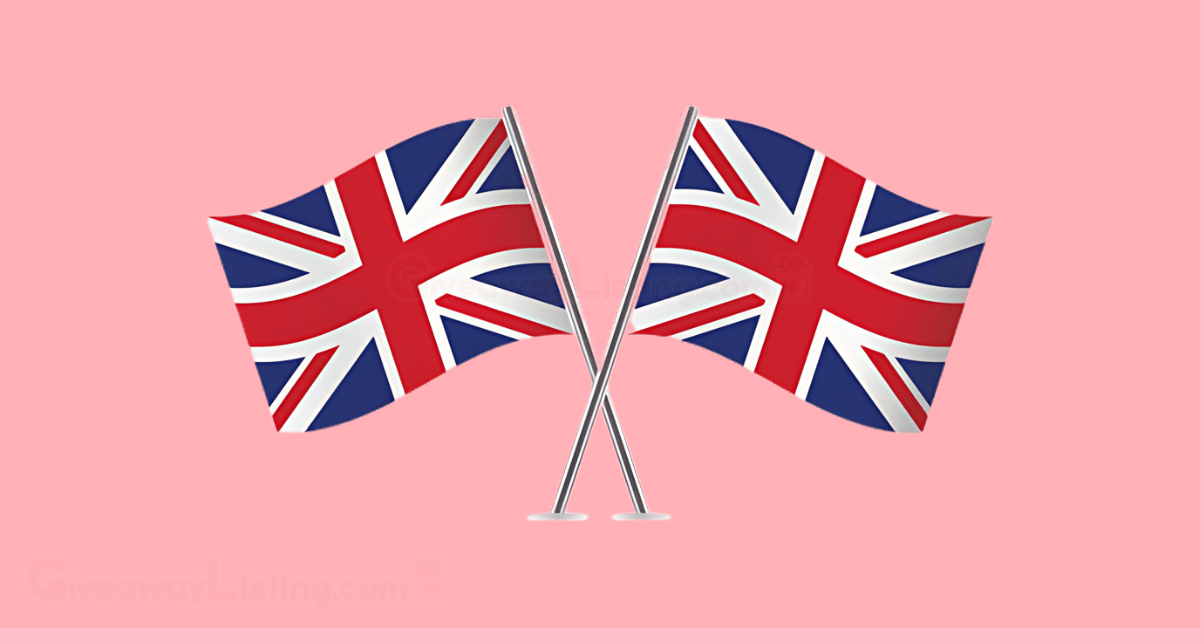
What are the Giveaway Rules in the UK?
Si quieres organizar un sorteo en el Reino Unido, aquí tienes algunas normas que debes tener en cuenta.
How to Avoid the Licensing Requirement?
El requisito de licencia del Reino Unido para 2024 se relaciona con los juegos de azar y los obsequios pagados.
Hay una serie de pasos a seguir para asegurarse de que su sorteo no está sujeto al requisito de licencia del Reino Unido. Para ello, puede estructurar su sorteo de estas dos maneras.
1. Make it a competition: If your giveaway participants must show skills or knowledge to enter, the giveaway may not be considered gambling. Therefore, no license will be required.
However, that’s if your giveaway rules can pass the court of law’s “skills test.” To ensure they can, you must structure the giveaway so most people can enter or win.
2. Make entry free: Paid entries require a license, and free giveaways require no permit.
Lotteries, Raffles, and Paid-to-enter Giveaways in the UK
La Ley del Juego del Reino Unido establece que determinados tipos de promociones, como las loterías, deben tener licencia.
Si organiza un sorteo informal en su lugar de trabajo, es una excepción a la regla. Sin embargo, si organizas un sorteo formal o público, puedes ser perseguido penalmente si no tienes licencia.
Esta ley sólo afecta a Inglaterra, Escocia y Gales en el Reino Unido porque todos estos países están supervisados por la misma Comisión del Juego. Irlanda del Norte tiene su propio organismo regulador.
The laws differ across the UK but will be the same in Great Britain. Northern Ireland differs when it comes to gambling and paid giveaways.
So, if you cannot meet both regions’ regulations, you can exclude people in Northern Ireland from qualifying to win a prize. You can limit your entries to residents of Great Britain to ensure you are acting following one set of rules.

UK Brand: A Case Study
The UK fashion brand Pretty Little Thing recently held an Instagram giveaway and was put under the spotlight in ways it did not want. It was said to have breached a few rules.
Here’s what went wrong.
Para ganar el lote de premios, la publicación del sorteo en Instagram especificaba que los participantes debían:
- Me gusta y guardar el post
- Etiqueta a tus mejores Galentines
- Comentar un emoji de corazón en CUALQUIER publicación
- Comparte el post en tu historia para una entrada extra
- Entra tantas veces como quieras
- Debes seguir a @prettylittlething para participar
Los participantes tenían hasta las 23.59 h GMT del 14 de febrero para participar.
So, what was wrong with their giveaway rules? There were quite a few things wrong with them.
The brand was criticized because there were too many giveaway rules. The brand was questioned about how they tracked which entrants had fulfilled the entry criteria. They were under fire for not administering the giveaway fairly.
To resolve this problem, the brand objected because it used a third-party app to host its giveaway. They argued that the third-party app produced the required data results, such as likes and comments.
El programa informático también comprueba la elegibilidad del ganador verificando manualmente todos los requisitos de participación antes de seleccionar al ganador al azar.
Pretty Little Thing was said to have breached the following rules of the ASA Committees of Advertising Practice Code, particularly:
- Rule 8.2: To avoid causing unnecessary disappointment.
- Rule 8.24: If winners are selected randomly by a third-party app, by an independent person, or under the supervision of an independent person, prizes must be given by the laws of chance.
Se acordó que la marca no podría verificar si el participante había comentado un emoji de corazón en el post y lo había guardado. Por lo tanto, el ganador elegido podría no haber cumplido todos los criterios de participación. Eso causaría una decepción innecesaria si se volviera a sortear el premio.
La participación extra también era motivo de preocupación, ya que no aumentaba las posibilidades de ganar del participante.
How to Avoid Similar Pitfalls
To avoid pitfalls like the above, ensuring that your giveaway entry criteria satisfy the Code’s rules is crucial.
En resumen, algunas de las normas de publicidad del Reino Unido son:
- Los requisitos para participar en el sorteo deben ser sencillos.
- Diseña tus sorteos de acuerdo con las normas de cada red social.
- Establish what apps can be used to check that entry criteria have been satisfied.
- Compruebe qué datos puede extraer de una plataforma de medios sociales y cómo puede utilizarlos para verificar un ganador.
- Escriba información clave en la entrada del sorteo, como los criterios de participación, el premio y las fechas de inicio y finalización.
- No olvides escribir los términos y condiciones del concurso en la descripción del post. Estos términos y condiciones deben incluir los requisitos del Código.

What are the Giveaway Rules in the US?
Para mantener todo dentro de la legalidad y evitar problemas legales en Estados Unidos, es necesario tener un conocimiento básico de las leyes del país, e incluso más específicamente de las de su estado.
Types of Giveaways in the US
It’s important to use the correct name of the giveaway type you hold in the US to avoid a misnomer resulting in legal issues.
There are three main types of giveaways. It doesn’t matter which one you decide to use, but you need to state which one you use clearly.
- Concursos
- Sorteo
- Rifas
If you need a refresher on the giveaway types, see our synopsis at the start of this guide.
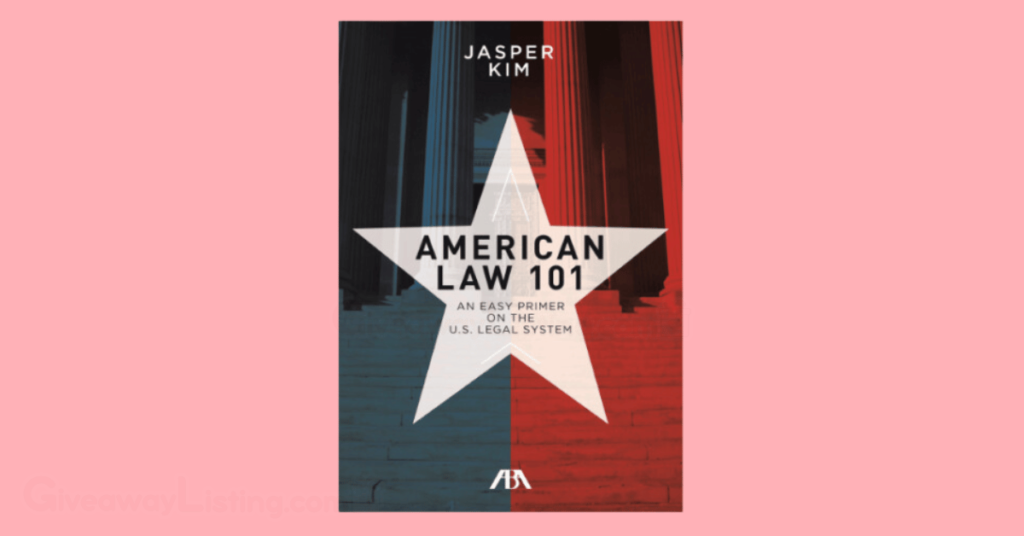
General Giveaway Laws in the US
Cuando organice un sorteo en Estados Unidos, las leyes sobre loterías y juegos de azar le prohíben promocionar cualquier sorteo con los tres elementos: premio, azar y contraprestación.
At least one of the three elements would have to be eliminated for the giveaway to be legal.
De suma importancia:
- Los sorteos no deben monetizarse ni exigir a los participantes el pago de una cuota de inscripción.
- Las leyes contra el juego se aplican a cualquier juego de azar en EE.UU., sobre todo a los online.
- Cualquier tipo de sorteo debe ser transparente e indicar la fecha en que se seleccionará al ganador, las probabilidades de ganar y los detalles principales.
Key Promotional Terms in the US
Si promociona un sorteo en Estados Unidos, es esencial que entienda bien la terminología.
Muchas personas intercambian términos promocionales clave en su detrimento. Una palabra incorrecta puede dar lugar a acciones legales si no puede defender el uso que hace del término.
Familiarícese con los detalles de estos términos clave para evitar meterse en problemas.
- Patrocinador
- Entrada
- Descripción de los premios
- Ganador
- Plataformas sociales
- Tax Awareness
Your official giveaway rules should clearly identify the promotion sponsors (if you have any) and include their physical addresses. Ensure your giveaway’s official rules and details clearly outline who is eligible to enter and how they can enter. Clearly state if there is a limit on the number of entries allowed.
Nota: By law, sweepstakes in the US must include an alternate method of entry (AMOE). You must provide alternative ways to enter the giveaway, giving everyone an equal chance. Some alternative entry methods include phone calls, text, email, social media, in-person, and online forms.
Always be descriptive about the giveaway prize. If the prize is instant cash, you need to outline how the cash will be issued. Will it be electronically awarded or paid via cheque, etc.? If the prize is an experience, what else is included? Where is it based, and how long will it last? Make sure to include all details of the prize.
Ensure the official rules clearly state how to win and how the winner will be selected. Using third-party apps is a great way to pick winners and avoid accusations of unfairness.
Describe the selection process. If you are holding a contest, judges will choose the winner. You need to specify how many winners will be selected and their odds of winning.
In addition to meeting giveaway laws in the US, following any social media rules is essential if you plan to host a sorteo en las redes sociales. Check out our handy guide if you’d like to host one, as each social media platform has its rules.
Any promotional giveaway with a prize valued at $600 or more has tax implications. You must inform the winner of any tax laws. A prize worth $600 or more must be reported to the Internal Revenue Service. The winner must complete a prize validation provided by you stating they understand the tax responsibility.
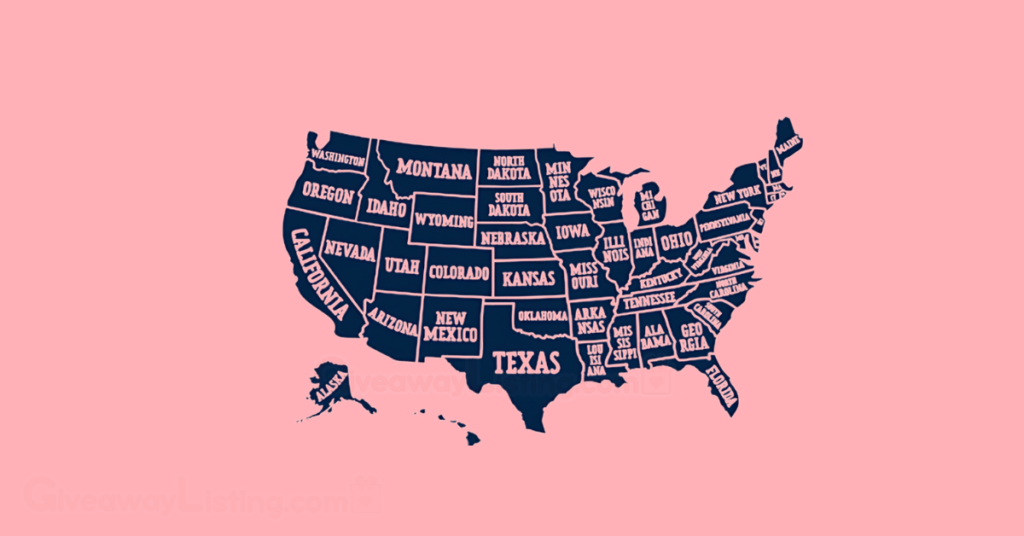
US State-Specific Giveaway Laws
Most states in the US follow general laws, but a few have slight differences. Some states have additional restrictions. The following additional laws will apply if you or any giveaway entrants reside in these states.
- Alabama: Sweepstakes that involve alcohol must be pre-approved by Alabama’s alcohol control board.
- Arizona: Beyond general US promotion laws, Arizona has three additional rules. First, you must not increase your product prices during the contest period. Second, you must register your skill-based contests that require participants to purchase a product with the state’s general attorney. You must also send a list of winners’ names to the state within 10 days of awarding the prize/s.
- California: No sweepstakes or contest can ask for the purchase of products, including entry fees. Any sweepstakes or contest involving alcohol must be open to all residents and not require them to visit certain premises. After that, general laws apply.
- Colorado: Again, no sweepstakes or contest can ask for the purchase of products, including entry fees. For mail-in events, entrants must receive detailed disclosures, for example, that the purchase is unnecessary and will not increase their winning chances. General promotion laws apply after that.
- Connecticut: Submission fees are allowed for skill-based contests, but limitations exist. You must ask the gaming department if your giveaway can request a payment. General laws apply after that.
- Florida: Seven days before a sweepstakes’ opening date, prizes worth $5K or more must be bonded and registered. Winners’ names must be provided to anyone who requests it. Standard laws apply after that.
- Indiana: Any alcohol sweepstakes must be pre-approved by Indiana’s alcohol control board. General laws apply after that.
- Maine: Any contests and sweepstakes open to minors may not collect personal data without consent from a legal guardian. General laws apply after that.
- Maryland: No skill-based contest can ask for the purchase of any kind, including entry fees. Standard laws apply after that.
- Massachusetts: No contests and sweepstakes may include tobacco-related prizes or activities. Standard laws apply after that.
- Michigan: Sweepstakes must not require entrants to visit a physical location like a store, as in-store entries constitute “consideration.” No contest or sweepstakes may include prizes associated with tobacco. General promotion laws apply after that.
- Nebraska: No sweepstakes or contest can ask for the purchase of products, including entry or submission fees. General laws apply after that.
- New Jersey: Again, no sweepstakes or contest can ask for the purchase of products, including entry or submission fees. General laws apply after that.
- New York: Seven days before a sweepstakes’ opening date, prizes worth $5K or more must be bonded and registered. Winners’ names must be provided to anyone who requests it, and names should be registered with the state. Standard laws apply after that.
- North Dakota: Once again, no sweepstakes or contest can ask for the purchase of products, including entry or submission fees. General laws apply after that.
- Ohio: Sweepstakes must not require entrants to visit a physical location, such as a store, as in-store entries constitute “consideration.” General promotion laws apply after that.
- Rhode Island: Retail businesses running sweepstakes with prizes totaling more than $500 must register their giveaway with the state. General laws apply after that.
- Tennessee: Sweepstakes winners must not be asked to accept publicity releases in perpetuity. Standard promotion laws apply after that.
- Vermont: No contest or sweepstakes may require a purchase, including entry fees. Anyone who requests sweepstakes winners’ names must not be required to pay postage fees. Any alcohol sweepstakes must be pre-approved by Vermont’s alcohol control board. General promotion laws apply after that.
- Virginia: Sweepstakes must not require entrants to visit a physical location like a store, as in-store entries constitute “consideration.” No contest or sweepstakes may include prizes associated with tobacco. General promotion laws apply after that.
What are Giveaway Rules in the EU?
The EU’s General Data Protection Regulation (GDPR) governs how an individual’s data can be processed and handled. To protect their data, all businesses must agree to follow specific requirements, including disclosure of what is collected and how it will be used.
El GDPR establece siete requisitos para la celebración legal de concursos. Debe cumplir cada uno de los siguientes:
- 1. Limitación de la finalidad
- 2. Legalidad, equidad y transparencia
- 3. Precisión
- 4. Minimización de datos
- 5. 5. Integridad y confidencialidad
- 6. Limitación de almacenamiento
- 7. Rendición de cuentas
The data you collect from giveaway participants must be used for “specified, explicit, and legitimate purposes.” You cannot use the personal data you collect in other ways.
You must get an individual’s consent to collect their data. You must state why you are collecting it and use it as you stated. You must be honest and clearly state how the data will be used and how it will be safeguarded.
You must agree to collect and store accurate data. Any inaccurate data must be deleted.
You can only request to collect the information you need for your giveaway purposes. This information should be the least amount necessary. This amount may be one or two criteria only. You should not collect any further information unless it is for specific and legitimate purposes.
You must agree to keep the collected data secure from threats and protect it from unauthorized handling, loss, and damage. You must have security measures in place to protect the data.
You must reason how long you will store the information you collected for your giveaway. After that time, the data should be anonymized and destroyed.
You must keep compliance records that authorities can access at all times. By maintaining records, you must be accountable and ready to face an unscheduled audit.
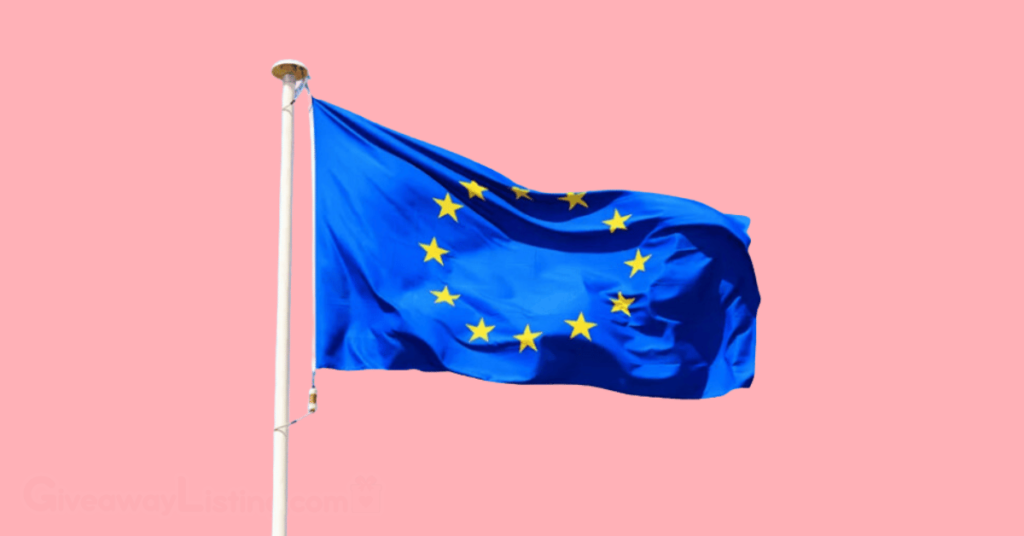
Other Eligibility Considerations in the EU
Debe abrir su concurso a todas las personas, con algunas excepciones y exclusiones de elegibilidad, incluyendo cualquiera de las siguientes (cuando sea aplicable):
- Los restringidos por ley
- Menores de 18 años
- Empleados de su empresa, de un patrocinador o de una filial, o cualquier familiar directo.
Normalmente se le permite rechazar a un premiado si entra en estas categorías:
- Si entran en los criterios de exclusión del concurso
- They misrepresented their personal information.
- Participaron en la preparación del concurso
EU-Specific Giveaway Contest Laws
Aquí tiene una lista de países de la UE y leyes específicas sobre regalos que no son las leyes estándar que se aplican a todos.
- The Netherlands: The giveaway prize must not exceed €100K annually. Each business has an annual maximum of one game of chance, with 20 drawings per game of chance maximum.
- Poland: All games of chance and giveaways are strictly regulated. Permits and bank guarantees are required, and the giveaway must occur in the country.
- France: No rules have to be filed with a judicial officer anymore, but you may need to record your giveaway with the data protection agency (CNIL).
- Germany: The Criminal Code, the German Act Against Unfair Competition, and the Interstate Treaty on Gambling govern giveaways. You must only collect data used for the contest.
- Italy: You must include a disclaimer stating that the giveaway is not associated with a social media network. The law also requires that collected data be hosted on an Italian server (which is impossible on social media).
- Spain: The winner selection process for random drawings must be conducted in the country. Sponsors must pay 10% of the value of the prize (which is gambling tax). Terms of the giveaway must be available to participants before entry and in Spanish.

What are the Rules for Holding a Social Media Contest?
If you run a social media promotion or giveaway, you need to know the specific rules of each platform. Social media rules are predominantly in effect worldwide.
Instagram requires you to include all official rules for the giveaway in your post. They discourage using likes for entries and tagging content or other people to enter the giveaway. There’s a release form that each person who enters the giveaway must complete.
Para saber más sobre los sorteos en Instagram, consulta nuestra guía completa sobre Regalos en Instagram.
You must also include all official rules and requirements of your giveaway when promoting on Facebook. In addition, you are required to add a statement that states Facebook is not affiliated with or sponsoring your giveaway. You cannot ask for likes as sweepstake entries.
See our Facebook giveaway guide to learn more about incredible giveaways on Facebook and its rules.
Twitter has fewer giveaway restrictions than Facebook and Instagram. However, you cannot ask entrants to duplicate tweets or ask them to create multiple accounts to increase their winning chances.
Para obtener más información sobre las normas de los sorteos en Twitter, consulta nuestra guía definitiva sobre Regalos en Twitter!
Giveaway Terms and Conditions: Final Thoughts
Cuando organices un sorteo, puedes mantener la diversión y la legalidad dondequiera que estés. Como hemos visto en esta guía, hay un puñado de normas que se aplican en todo el mundo.
Still, you should note specific terms and conditions applicable to the country where you run your promotion.
If you need more help with giveaways, our website has plenty of guides! Each guide contains handy tips. Check out our consejos para regalos para empezar.
Vuelva a consultar con Lista de regalos for the latest giveaway guides, and browse our live feeds to get inspiration for your next viral contest.
Running a small giveaway within your country can work to your advantage. It can also go viral and earn new leads for your business.

Giveaway Terms and Conditions FAQs
Here are answers to some frequently asked questions about Giveaway Terms and Conditions.
What Countries Allow Giveaways?
Most countries generally allow giveaways, but some have stringent laws that make it nearly impossible to run a practical giveaway.
What Countries Prohibit Giveaways?
Some countries have many restrictions, making it tricky to include them in worldwide sweepstakes.
Por ejemplo, algunos tienen estrictos requisitos de registro y fianza y leyes de concesión de licencias, especialmente Quebec (Canadá), Austria, Brasil, la República Checa, Hong Kong y Filipinas. Australia tiene requisitos diferentes según el estado.
Otros países, como Italia y España, son impracticables, ya que exigen que los ganadores sean ciudadanos locales, lo que hace imposible celebrar sorteos mayores (que sean legales).


